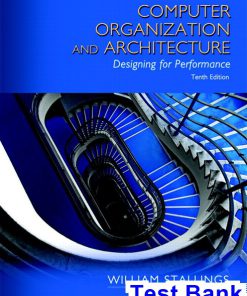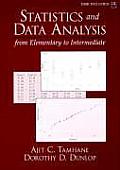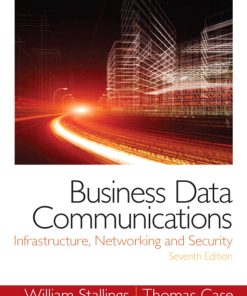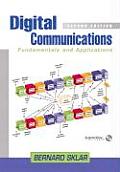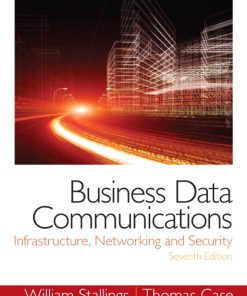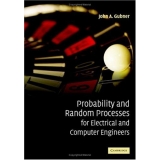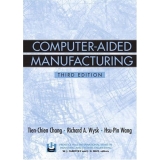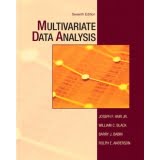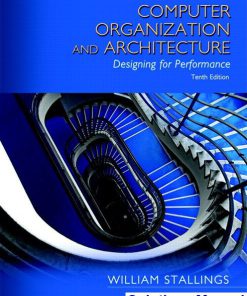Solutions Manual to accompany Data and Computer Communications 10th edition by Stallings 0133506487
$35.00 Original price was: $35.00.$26.50Current price is: $26.50.
Solutions Manual to accompany Data and Computer Communications 10th edition by Stallings 0133506487
Solutions Manual to accompany Data and Computer Communications 10th edition by Stallings 0133506487
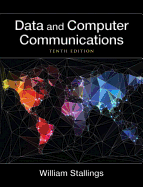
Product details:
- ISBN-10 : 0133506487
- ISBN-13 : 978-0133506488
- Author: William Stallings
Data and Computer Communications, 10e, is a two-time winner of the best Computer Science and Engineering textbook of the year award from the Textbook and Academic Authors Association. It is ideal for one/two-semester courses in Computer Networks, Data Communications, and Communications Networks in CS, CIS, and Electrical Engineering departments. This book is also suitable for Product Development personnel, Programmers, Systems Engineers, Network Designers and others involved in the design of data communications and networking products.
Table contents:
PART ONE OVERVIEW
Chapter 1 Data Communications, Data Networks, and the Internet
1.1 Data Communications and Networking for Today’s Enterprise
1.2 A Communications Model
1.3 Data Communications
1.4 Networks
1.5 The Internet
1.6 An Example Configuration
Chapter 2 Protocol Architecture, TCP/IP, and Internet-Based Applications
2.1 The Need for a Protocol Architecture
2.2 A Simple Protocol Architecture
2.3 The TCP/IP Protocol Architecture
2.4 Standardization within a Protocol Architecture
2.5 Traditional Internet-Based Applications
2.6 Multimedia
2.7 Sockets Programming
2.7 Recommended Reading
2.8 Key Terms, Review Questions, and Problems
Appendix 2A The Trivial File Transfer Protocol
PART TWO DATA COMMUNICATIONS
Chapter 3 Data Transmission
3.1 Concepts and Terminology
3.2 Analog and Digital Data Transmission
3.3 Transmission Impairments
3.4 Channel Capacity
3.5 Recommended Reading
3.6 Key Terms, Review Questions, and Problems
Appendix 3A Decibels and Signal Strength
Chapter 4 Transmission Media
4.1 Guided Transmission Media
4.2 Wireless Transmission
4.3 Wireless Propagation
4.4 Line-of-Sight Transmission
4.5 Recommended Reading
4.6 Key Terms, Review Questions, and Problems
Chapter 5 Signal Encoding Techniques
5.1 Digital Data, Digital Signals
5.2 Digital Data, Analog Signals
5.3 Analog Data, Digital Signals
5.4 Recommended Reading
5.5 Key Terms, Review Questions, and Problems
Chapter 6 Error Detection and Correction
6.1 Types of Errors
6.2 Error Detection
6.3 Parity Check
6.4 The Internet Checksum
6.5 Cyclic Redundancy Check (CRC)
6.6 Forward Error Correction
6.7 Recommended Reading
6.8 Key Terms, Review Questions, and Problems
Chapter 7 Data Link Control Protocols
7.1 Flow Control
7.2 Error Control
7.3 High-Level Data Link Control (HDLC)
7.4 Recommended Reading
7.5 Key Terms, Review Questions, and Problems
Appendix 7A Performance Issues
Chapter 8 Multiplexing
8.1 Frequency-Division Multiplexing
8.2 Synchronous Time-Division Multiplexing
8.3 Cable Modems
8.4 Asymmetric Digital Subscriber Line
8.5 xDSL
8.6 Multiple Channel Access
8.7 Recommended Reading
8.8 Key Terms, Review Questions, and Problems
PART THREE WIDE AREA NETWORKS
Chapter 9 WAN Technology and Protocols
9.1 Switched Communications Networks
9.2 Circuit Switching Networks
9.3 Circuit Switching Concepts
9.4 Softswitch Architecture
9.5 Packet-Switching Principles
9.6 Asynchronous Transfer Mode
9.7 Recommended Reading
9.8 Key Terms, Review Questions, and Problems
Chapter 10 Cellular Wireless Networks
10.1 Principles of Cellular Networks
10.2 Cellular Network Generations
10.3 LTE-Advanced
10.4 Recommended Reading
10.5 Key Terms, Review Questions, and Problems
PART FOUR LOCAL AREA NETWORKS
Chapter 11 Local Area Network Overview
11.1 Bus and Tree Topologies
11.2 LAN Protocol Architecture
11.3 Bridges
11.4 Hubs and Switches
11.5 Virtual LANs
11.6 Recommended Reading
11.7 Key Terms, Review Questions, and Problems
Chapter 12 Ethernet
12.1 Traditional Ethernet
12.2 High-Speed Ethernet
12.3 IEEE 802.1Q VLAN Standard
12.4 Recommended Reading
12.5 Key Terms, Review Questions, and Problems
Appendix 12A Digital Signal Encoding for LANs
Appendix 12B Scrambling
Chapter 13 Wireless LANs
13.1 Overview
13.2 IEEE 802.11 Architecture and Services
13.3 IEEE 802.11 Medium Access Control
13.4 IEEE 802.11Physical Layer
13.5 Gigabit Wi-Fi
13.6 IEEE 802.11 Security Considerations
13.7 Recommended Reading
13.8 Key Terms, Review Questions, and Problems
PART FIVE INTERNET AND TRANSPORT LAYERS
Chapter 14 The Internet Protocol
14.1 Principles of Internetworking
14.2 Internet Protocol Operation
14.3 Internet Protocol
14.4 IPv6
14.5 Virtual Private Networks and IP Security
14.6 Recommended Reading
14.7 Key Terms, Review Questions, and Problems
Chapter 15 Transport Protocols
15.1 Connection-Oriented Transport Protocol Mechanisms
15.2 TCP
15.3 UDP
15.4 Recommended Reading
15.5 Key Terms, Review Questions, and Problems
UNIT TWO ADVANCED TOPICS IN DATA COMMUNICATIONS AND NETWORKING
PART SIX DATA COMMUNICATIONS AND WIRELESS NETWORKS
Chapter 16 Advanced Data Communications Topics
16.1 Analog Data, Analog Signals
16.2 Forward Error Correction Codes
16.3 ARQ Performance Issues
16.4 Recommended Reading
16.5 Key Terms, Review Questions, and Problems
Chapter 17 Wireless Transmission Techniques
17.1 MIMO Antennas
17.2 OFDM, OFDMA, and SC-FDMA
17.3 Spread Spectrum
17.4 Direct Sequence Spread Spectrum
17.5 Code-Division Multiple Access
17.6 Recommended Reading
17.7 Key Terms, Review Questions, and Problems
Chapter 18 Wireless Networks
18.1 Fixed Broadband Wireless Access
18.2 WiMAX/IEEE 802.16
18.3 Bluetooth Overview
18.4 Bluetooth Radio Specification
18.5 Bluetooth Baseband Specification
18.6 Bluetooth Logical Link Control and Adaptation Protocol
18.7 Recommended Reading
18.8 Key Terms, Review Questions, and Problems
PART SEVEN INTERNETWORKING
Chapter 19 Routing
19.1 Routing in Packet-Switching Networks
19.2 Examples: Routing in ARPANET
19.3 Internet Routing Protocols
19.4 Least-Cost Algorithms
19.5 Recommended Reading
19.6 Key Terms, Review Questions, and Problems
Chapter 20 Congestion Control
20.1 Effects of Congestion
20.2 Congestion Control
20.3 Traffic Management
20.4 Congestion Control in Packet-Switching Networks
20.5 TCP Congestion Control
20.6 Datagram Congestion Control Protocol
20.7 Recommended Reading
20.8 Key Terms, Review Questions, and Problems
Chapter 21 Internetwork Operation
21.1 Multicasting
21.2 Software Defined Networks
21.3 OpenFlow
21.4 Mobile IP
21.5 Recommended Reading
21.6 Key Terms, Review Questions, and Problems
Chapter 22 Internetwork Quality of Service
22.1 QoS Architectural Framework
22.2 Integrated Services Architecture
22.3 Resource Reservation Protocol
22.4 Differentiated Services
22.5 Service Level Agreements
22.6 IP Performance Metrics
22.7 Recommended Reading
22.8 Key Terms, Review Questions, and Problems
Chapter 23 Multiprotocol Label Switching
23.1 The Role of MPLS
23.2 Background
23.3 MPLS Operation
23.4 Labels
23.5 FECs, LSPs, and Labels
23.6 Label Distribution
23.7 Traffic Engineering
23.8 Virtual Private Networks
23.9 Recommended Reading
23.10 Key Terms, Review Questions, and Problems
PART EIGHT INTERNET APPLICATIONS
Chapter 24 Electronic Mail, DNS, and HTTP
24.1 Electronic Mail: SMTP and MIME
24.2 Internet Directory Service: DNS
24.3 Web Access: HTTP
24.4 Recommended Reading
24.5 Key Terms, Review Questions, and Problems
Chapter 25 Internet Multimedia Support
25.1 Real-Time Traffic
25.2 Voice Over IP
25.3 Session Initiation Protocol
25.4 Real-Time Transport Protocol
25.5 Recommended Reading
25.6 Key Terms, Review Questions, and Problems
APPENDICES
Appendix A Fourier Analysis
A.1 Fourier Series Representation of Periodic Signals
A.2 Fourier Transform Representation of Aperiodic Signals
A.3 Recommended Reading
Appendix B Projects and Other Student Exercises for Teaching Data and Computer Communications
People also search:
data and computer communications 10th edition pdf
william stallings data and computer communications 10th ed pdf
william stallings data and computer communications 10th edition pearson 2014
data and computer communications 10th ed. by william stallings pearson
data and computer communications 10th edition
You may also like…
Solution Manual
Solution Manual
Solution Manual
Solution Manual
Solutions Manual to accompany Computer-Aided Manufacturing 3rd edition 9780131429192




